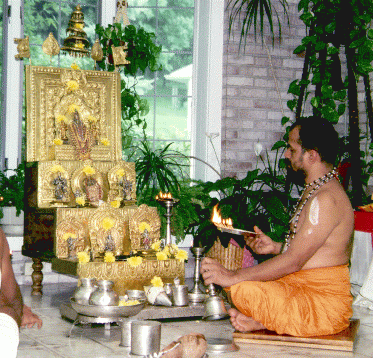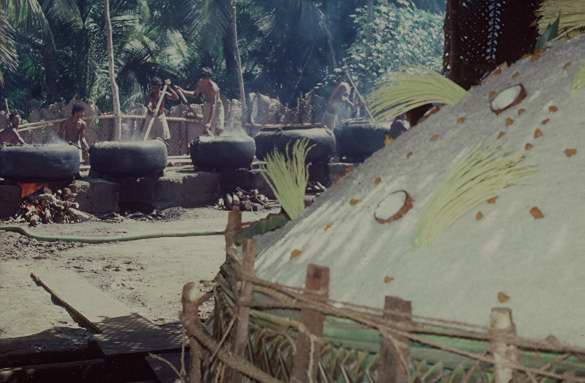
His Holiness Sripada Sugunendra Theertha Swamiji - Puttige Swami speaks on Sin and other topics: Part 1.

I hope this to lead for further "jijnasa" to enlighten ourselves. In this part I am covering questions related to Vegetarian and Non vegetarian related things. Further parts cover the other topics.
Shri Hari Priyatham.
B.Gopalakrishna.
"GOPALAKRISHNA.B VARNA" bgkvarna@yahoo.com
Mon, 13 Dec 1999 12:12:20 -0800 (PST)
SWAMIJI: This is a very good question. It is true that plants also have "life" and killing plants is also sin. So the best way to observe total non-violence is to follow "Shiloncha Vraththi". That is to take only those fruit fallen from the trees, plants. In this way we are doing harm to none. But everyone can not follow that. We have to take food to survive and sustain this body and it the question of survival. So we need to take that path which is less sinful and less harm to other "jivi".
Now there are two reasons to say that vegetarian food is having insignificant sin. Many of the plants like rice, wheat etc. are having life only for one crop time. Once their yield is over, they die, even if we don't cut them. So by cutting those plants we are doing we less sin or no sin at all. In many other plants, like mango, coconut etc, by plucking the fruit, we are not killing the plants and so we are doing very minimal sin or no sin at all. So vegetarian food is less sinful. More over it is inevitable for our survival, but non-vegetarian food is a luxury to us and we can afford to avoid that. It is more sinful since we are killing animals all the time.
Next we need to know why certain acts are sinful. Each and every life (plants, animals etc) has come to this world, to do "sadhana"(efforts), to get better life and finally get "moksha". Whenever such "sadhana" opportunity is cut short, it becomes sin. For plants there is no much "sadhana". They can not do any kind of physical or mental activities, in terms of "sadhana". So by cutting them, we are not doing many harms to their "sadhana" or reducing their opportunity for "sadhana". So it is not sinful. But animals can do a good amount of "sadhana" by means of physical and / or mental activities. By killing them, we are cutting short their opportunities to do "sadhana" towards moksha. So it is more sinful.
To support this aspect further, "suicide" is considered as biggest sin, even though no one else is troubled other than the self, because God has given us this wonderful body and mind to do "sadhana" towards moksha and by rejecting this offer or by cutting short this "sadhana", we are insulting God and betraying him. So it is highly sinful. There is another example in "Sasthra". Suppose there is a very very old man, incapable of doing any physical and mental activities. Then he can enter to fire to end his life. That is not sin because he can not do any more "sadhana" by himself or through others. So in general any act which is cutting short others or self "sadhana", it is considered as sin. and vegetarians are doing less sin.
Q.2) We were thinking that only human beings, having 'thinking power' can only do "sadhana" and other animals can not. Is it not true? How animals can do "sadhana"?
SWAMIJI: It is not true. All animals can also do "sadhana". Otherwise there is a fundamental problem in the system. If animals can not do "sadhana", they can not get better life, namely human life. If they can not get human life, then they can not get "moksha" at all at any time. This is not true and so it is proved that animals also do "sadhana" and get better life.
They do 'sadhana' by their mental activities. We can see lot of difference
in the behavior of animals. In the same category say cat, dog or cow, we
can see lot of difference like some are soft, some are sensitive, some
are more active etc. This is due to their mental "sadhana". Also in kids
who are not having any thinking power, we are seeing lot of differences.
We have seen a kid, in Bombay, around 2 years old. It loves Krishna like
anything. While sleeping, it tightly hugs Krishna idol; does not drink
milk without offering to Krishna; always want to listen to Krishna's story;
always wants to witness Krishna Pooja. It is really surprising. It is all
due to previous "samskara". Like that animals also will have previous samskara
and "sadhana".
Q. 3) Is it true that in olden days, sages used to eat meat? There is an incident of 'Agasthya' eating meat in " Vathapi - Ilvala" story.
SWAMIJI: Yes, we can see some mention about such things in very old stories. We need to understand clearly why and under what circumstances they used to consume meat. Firstly they used to take meat, not as their regular food. The animal would be offered to 'yajna', the sacred fire and then the sages, having high yogic power would consume the meat as prasad of the yajna. Due to this auspicious activity, the animal would go to heaven. In the story of 'Augusthya', when he said ' Vathapi jirno bhava', he got digested immediately. Such was the power in those days.
But now meat is not approved to Brahmins.
First we need to understand why we consume food. It is to have good health.
Health means not only the physical health. The mental health plays a very
important role. That's why in Sanskrit it is known as "swasthya" means
mental peace, purity and health. Meat or non-vegetarian food improves body
and but not the mind. So for those people, who need to have physical strength,
like solders, meat is not prohibited. Solders need not have any thinking
power. They have to fight like machines. But for Brahmins, mental power
is more important. We need to have peace and purity of mind, stability
and concentration of mind. So for us meat is prohibited. Since ages our
ancestors were having vegetarian food and so Brahmins are generally considered
as soft, kind hearted, stable and intelligent people. If we start consuming
meat, slowly we will loose all these good qualities. We will not see the
changes overnight. It takes time and we will see the changes in the later
generations.
Q. 4) There are many noble laureates who are meat eaters. What we can say for that?
SWAMIJI: Getting a noble prize is not at all a
yardstick to measure the peace and purity, stability and concentration
of mind. It is known that suicide rate is high in scientists too.
Actually scientists are more disturbed in their mind. Due to this, they
get activated and get involved deeply in something and come out with some
new things. For their success, the basic reason is not the peaceful mind,
but disturbed mind. Generally Brahmins who is suppose to have the mental
capacity to understand ' Brahma', need to have very good concentration
power for 'japa' and 'tapa'. and they are supposed to be mentally
not disturbed people. In olden days even if they consume meat, they
used to keep up their mental stability and peace of mind, due to their
yogic power or 'thapas'. But now in 'Kaliyuga', as such our mental powers
and concentration powers are getting reduced. We are loosing our purity
and peace of mind due to various reasons. As such the 'satvic' atmosphere
and 'satvic' qualities are reducing because we are not doing enough
'japa', 'tapa' etc. So if we start consuming meat we will loose all our
good mental qualities soon. So in 'kaliyuga', meat is strictly prohibited
for Brahmins. It is also sinful as said in previous answers.
Q. 5) Is it not sin to kill silkworms for silk and deer's for 'krishnaa-jina'?
SWAMIJI : Short answer is it is sin if we do for trading purpose. For detailed answer, first we need to understand what sin is. It is not a substance associated with a particular activity. The same activity can be resulted in sin or not depending upon the purpose, intention and circumstance. For e.g. killing in general is sin, but killing a demon or man hunter is not sin. Similarly in olden days kings used to go for hunting. It was not sin because they used to kill only those wild animals, which are troublesome to the sages and the nearby villagers. Similarly if we kill animal to avoid being killed, it is not sin. As said earlier, every creature in this world is for doing "sadhana". Here the priority is for those doing greater "sadhana". To accomplish that, if others have to sacrifice their "sadhana", there is no harm in that. For e.g.: Assume that there are two students in a house, One if preparing for second grade and other one preparing for Medical exam. Though both are preparing for their exams, we consider that medical exam is more important and give preference to him. If needed, we may ask the other to sacrifice his preparation, because he doesn't lose much. Similarly in this world, "jivi" doing higher order of "sadhana", gets preference. So for the benefit of that, others with little "sadhana" may be sacrificed without any sin. So if we are preparing silk for God's pooja, then it is not sin. But if we are preparing silk for decorating ourselves, it is sin. So we need to understand what is the purpose of the act and what we are going achieve finally.
(To be continued ...)

A mound of rice and view of the open kitchen behind.


![]()

![]()
![]()
![]()

![]()

Gaudiya Vaishnava line![]() Related
Sites Index
Related
Sites Index![]() NZ
H K Resource Net'
NZ
H K Resource Net'![]() the
Madhwas-Dvaita
the
Madhwas-Dvaita![]() Sri
Vaishnavas
Sri
Vaishnavas
![]()